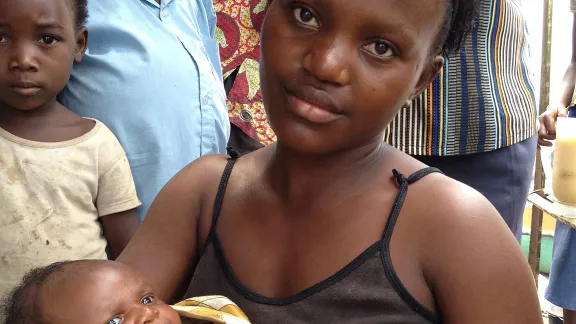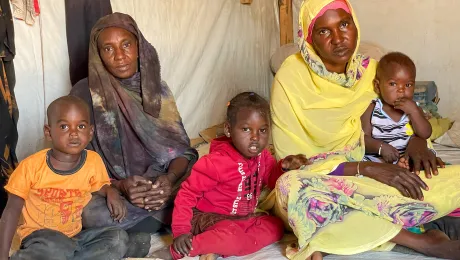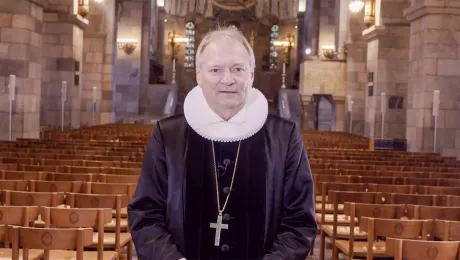
Mary Maurita and newborn Chance. Photo: ACT/DCA/Mai Gad
LWF Provides Life-Saving Supplies to Fleeing Congolese Families
(LWI) More than 66,000 refugees have entered Uganda in just two days after the Ugandan rebel group Allied Democratic Forces (ADF) attacked their hometown in Kamango in neighboring Democratic Republic of Congo. The overwhelming refugee influx has overstretched the capacity of the newly established Bubukwanga refugee camp in western Uganda. In response The Lutheran World Federation (LWF) a member of the ACT Alliance is stepping up efforts to provide life-saving water, sanitation and hygiene to the refugees.
The large influx of refugees found Uganda unprepared, but within a week, the Bubukwanga camp had been established in Bundibugyo and the United Nations High Commissioner for Refugees (UNHCR) and the Office of the Prime Minister (OPM) ensured coordination of partners to respond to the emergency.
The LWF, a member of ACT Alliance was among the first organizations to arrive at Bubukwanga, providing life-saving water, sanitation and hygiene to the refugees, with some notable accomplishments. So far, the LWF has provided 10 water tanks with a capacity for 10,000 liters, six hand-washing facilities, 1,000 jerry cans of soap and saucepans for food distribution, mobilized two hygiene promoters, and fenced 450 meters of the camp.
However, the capacity in Bubukwanga remains overstretched and urgent support is needed to meet the basic needs of the 15,559 refugees currently staying there.
“There are still many gaps in the camp—shelters, sanitation and hygiene are some of the critical areas,” says Bafaki Charles, OPM senior settlement officer and coordinator for refugees.
So far 293 refugees in Bubukwanga share one latrine, yet the humanitarian standards for emergencies, SPHERE, point to 20 people to one toilet. SPHERE standards for access to water are also far from covered.
UNHCR expects the camp’s population to reach 20,000 people within a short while as convoys continue to arrive with refugees from DRC, and the LWF is preparing for even more arrivals in the coming days.
Ran from the Bullets with Newborn Baby
One of the refugees in the Bubukwanga camp is 20-year-old Mary Maurita. She is breastfeeding her four-day-old baby in a shelter made of palm tree stems covered with grey blankets to provide shade.
“I heard the bullets and ran away from the hospital with my newborn son,” Maurita says and looks at her son.
Only four hours after she had given birth, she heard the sound of bullets and ran from the hospital towards her home, where she woke up her husband, 24-year-old Kalikona Bosco, and their two-year-old son Mawombi Richard.
“It was chaotic, I just carried my baby and what I was putting on, we ran as fast as we could to escape the bullets, but I was in pain because of the birth,” Maurita says.
After eight hours on the road together with crowds of people from Kamango, Maurita and her husband were in safety in Uganda.
“We decided to give our son the name Chance. We are happy he survived the war,” she says and her husband agrees.
“I was lucky my wife woke me up and I am happy we are now in safety here in Uganda, where we get food and shelter and I have my family with me,” Bosco says.
Escaped Alone with His Three Sons
Another eyewitness of the ADF attack in DRC is 53-year-old Bhyaruhanga Jululu, who came to Uganda with his three sons.
“My neighbors said they had seen the rebels and when we heard the shootings we all started running. When we came into Uganda my wife did not want to come to the camp but wanted to stay near the border so she could go home again, I came to the camp with three of our children, my wife has the other two,” Jululu says, adding that the attack came as a shock for everyone in his hometown.
“I heard that far away from Kamango rebels are in the bush, but none of us expected any rebels to reach our home,” he says.
To Jululu’s big disappointment, his wife decided to remain near the DRC border in order to go back home and pick their belongings.
“I tried to convince her to come with me to the camp where we are safe, but she refused,” he says.
According to Ndiji Kwaninitedid, LWF’s counselor on sexual gender-based violence (SGBV) in Bubukwanga, it is a high risk to return to the DRC at this moment.
“On Saturday a big crowd of women went back to DRC to get food and to pick their belongings, but on their way to their homes soldiers raped them and those who refused were killed,” Kwaninitedid explains. She adds that many cases have not yet been reported to the Uganda police, since women fear that their men will refuse them if they are raped.
In response to sexual-based violence among the Congolese refugees, UNHCR has asked the LWF to be in charge of SGBV in Bubukwanga camp. The LWF has mobilized and trained SGBV counselors among the refugees to support and ensure that those with such cases know where they can share and report them.
Local Community Overwhelmed
Before the recent influx in Bundibugyo, Uganda was already hosting more than 210,000 registered refugees and asylum seekers, 63 percent of who originate from the DRC. The high numbers have overwhelmed the local community.
Before the Bubukwanga camp was established the refugees found shelter in five nearby schools and churches in Bundibugyo town. This resulted in school desks being used as firewood, and schools were closed.
To respond to the urgent need to get the local schools running again, ACT Alliance member LWF provided 180 desks to support the community schools in Bundibugyo on 22 July.
“We are grateful to LWF for providing the school desks, this will help a lot. But it is still a drop in the ocean, one school has 100 desks, and even chairs were broken and used as firewood, so more support is needed,” says OPM officer Charles.
(This article was written by Mai Gad, communication officer for DanChurchAid)


